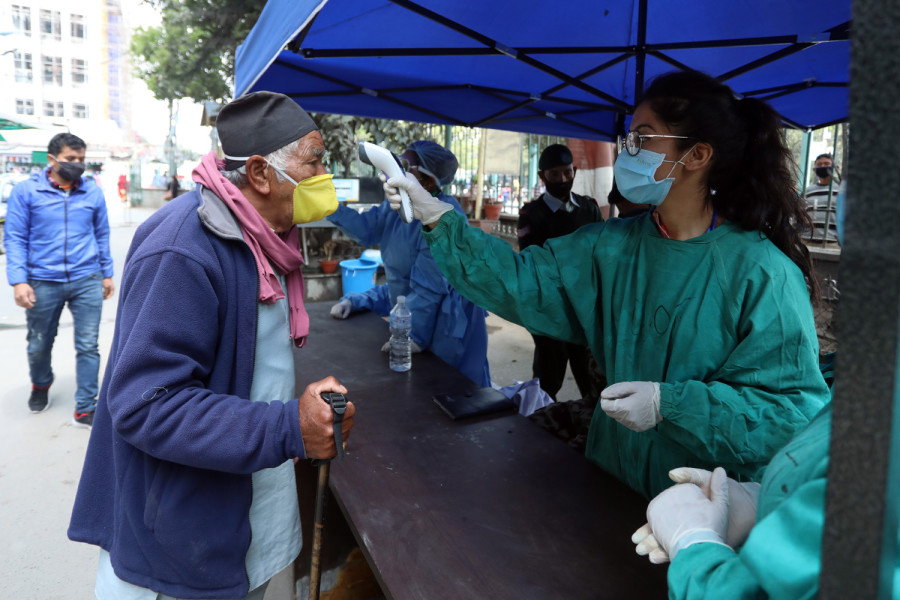Opinion
Responsibility and accountability during a pandemic
All stakeholders, including medical workers, the government and the general public, must do their part.
The global Covid-19 pandemic has begun to severely affect life in Nepal. For weeks, if not months, officials, healthcare workers and the general public have been largely complacent in their preparations against the disease. As the outbreak moved westwards from East Asia, seemingly skipping South Asia for the better part, Nepalis had taken a lax attitude towards this deadly and highly infectious virus. However, now that India faces a sudden surge of reported cases, and seven confirmed deaths as of March 22 (and climbing), South Asian countries have been awakened to how much of a strain this virus puts on the healthcare system.
It is unsure whether the cases in the neighbourhood have suddenly ballooned with rapid infections, or whether there has been a lack of enough testing and tracking. However, what is sure is that all stakeholders have the responsibility to carry out their respective roles. Should one gear in the system fail, the entire machinery can come crumbling down.
In times of disease outbreaks, the main responsibility falls on medical workers. Such is the nature of their profession. If the current crisis were an earthquake, like in 2015, the first responders and the ones with the most gruelling of jobs would likely be fire-fighters and security personnel. In times of a health crisis, it is only natural that the people rely on those that have made it their mission to study and protect the human body. All around the world, medical workers, including doctors, pathologists, virologists and nurses, among others, have been hailed as true heroes who have risked their lives to care for the ones affected, not to mention handling the regular stream of patients suffering from other ailments, too.
It is unfortunate, then, that in Nepal there have been reports of medical workers, in both private and public hospitals, who have applied for leave during such crucial times. The panic-driven cowering seems to have come after the federal government directed large hospitals to not refer cases out, and to utilise the large bed capacity they have to treat patients in-house. The medical workers attempting to shirk duties at such a crucial time are unworthy of their profession. Such lack of professional responsibility puts a larger burden on the health workers who still understand the importance of their work.
But this also shows a lack of preparedness on the part of hospitals and the government. A lot of workers who are abandoning ship claim that they lack the resources and training to tackle the Covid-19 pandemic. The hospitals, especially the private ones, charge large sums of money from patients to provide them with care. There should have been more investment in training and equipment; perhaps then the workers would not have been caught so flat-footed.
The government too is at fault here. Although the medical profession is one that is inherently risky, no one should be forced to go without the most basic of protections that their occupation entails. It has been more than a month since the World Health Organisation confirmed that this disease was spreading from person to person, and that it was highly infectious. Given China’s proximity to Nepal and the rapid spread of the disease in South Korea, Japan, Iran, Italy and other countries, the government should have learnt vital lessons and stocked up on protective gear for those on the frontlines. It is not too late still for the government to fulfil its responsibilities, which include the correct and timely dissemination of information, and clarifying what added benefits workers at risk of contracting the disease are due.
Lastly, it is also the responsibility of members of the public to isolate themselves as much as possible. As cases in Italy have shown, a sudden surge in cases to treat puts an unworkable burden on the healthcare system. More people are likely to succumb to the disease in such a scenario. However, if people practise social distancing, wash their hands regularly and self-quarantine when they are sick, the virus will have fewer fresh hosts to jump to. This does not mean that the virus will definitely be defeated solely adopting these measures, but fewer cases of the disease at any given time would mean more resources available for each serious case, leading to fewer mortalities. It is necessary for those who can work from home to do so, so that those who are compelled by their work to venture outside can practice social distancing in a safer manner.
***
What do you think?
Dear reader, we’d like to hear from you. We regularly publish letters to the editor on contemporary issues or direct responses to something the Post has recently published. Please send your letters to [email protected] with "Letter to the Editor" in the subject line. Please include your name, location, and a contact address so one of our editors can reach out to you.




 20.12°C Kathmandu
20.12°C Kathmandu









